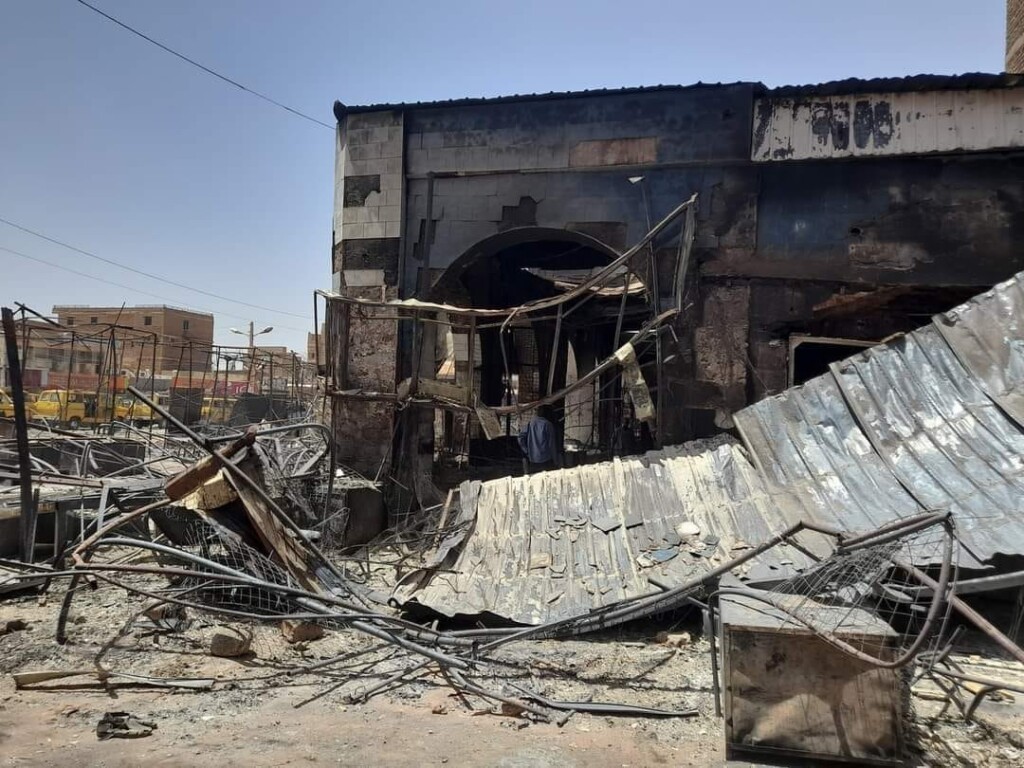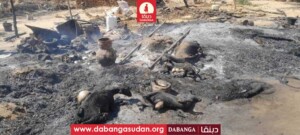RSF begin forced evacuation of Khartoum North residents

A market in Khartoum damaged by war (Photo: Ayin Network)
The Bahri Emergency Room revealed that the Rapid Support Forces (RSF) began the forced evacuation of residents of the northern and eastern areas of Bahri locality on Saturday as part of the escalation of combat operations in the area. The southern Khartoum area is in a state of cautious calm despite hunger.
The Bahri Emergency Room and neighbourhood committees confirmed that the RSF are forcibly evacuating the areas around the Signal Corps in Khartoum North (Khartoum Bahri) as part of an attack on the Hattab and Kadaro neighbourhoods.
According to Bahri Emergency Room member Akif Mukhtar, the neighbourhoods of Samara, Nabata, and Dardoug have been witnessing forced evacuations since Saturday, as they are adjacent to Hattab and Kadaro.
Hattab neighbourhood has been a site of fierce battles, including drone strikes, since army forces attacked RSF positions there late February.
Mukhtar pointed out that the northern and eastern Bahri areas, especially Samara and Dardoug, had been witnessing relative stability until the military operations expanded. The neighbourhoods host a large number of displaced people. He said that new displacement would exacerbate difficulties in obtaining water, shelter, food, and funds.
“The situation is tragic,” said Mukhtar, calling for effective measures to protect citizens and keep military operations away from the population.
Expressing grave concern over the safety and security of civilians, the Bahri Emergency Room highlighted the increasing threats and violations faced by residents in a statement on Sunday.
Cautious calm
The Southern Belt Emergency Room said that southern Khartoum is in a state of cautious calm after clashes between the Sudanese Armed Forces (SAF) army and the RSF decreased for three days.
Despite the calm, several civilians have been injured by stray bullets, the emergency room stated in a statement on social media yesterday.
The Southern Belt activists also reported a significant shortage of medicines, especially for chronic diseases. Soaring prices are exacerbating the inaccessibility of medicine. A dialysis centre in the area charges a daily fee of 15,000 SDG, the statement said.
People are subject to continuous searches and detentions when passing through military checkpoints. Despite the cautious calm, people are enduring the sound of bullets, artillery shells, warplanes, and surface-to-air missiles.
Staying connected has become increasingly expensive. The ongoing internet and communications blackout in most of Sudan has forced people to use costly Starlink satellite services, pushed people to travel to places with network connection, and prevented financial transfers.
Two of the three Internet networks, Sudani and Zain, returned to many areas of the country, but Khartoum state remains among the regions that still suffers from complete isolation and disruption of all services.
Food shortages
The prices of food and other basic commodities are also surging. Radio Dabanga was able to verify that two children starved to death in Jebel Aulia in southern Khartoum, whilst hundreds of community kitchens have shut down.
The Khartoum State Emergency Room confirmed in a report that 221 of the 300 community kitchens in the state had to be suspended due to the continued interruption of communications networks.
Akef Mukhtar, a member of Bahri’s emergency room in Khartoum North, told Radio Dabanga that 59 communal kitchens have stopped serving food to citizens due to communications and internet outages.
The Khartoum State Emergency Room said in a report yesterday that the number of arrivals to the remaining kitchens is increasing day by day and pointed to an unknown number of deaths due to hunger and malnutrition. Within Khartoum state, approximately 240,000 families are threatened with hunger, which requires an urgent response from all concerned parties, said the report.
The UN World Food Programme (WFP) has warned that the vast majority of Sudanese face severe hunger, with more than five million people unable to have one adequate meal per day, amidst 10 months of war.
More than 55 UN experts stated on February 5 that “about 17.7 million people across the country, representing 37 per cent of the population, face acute hunger.” It is reportedly the worst hunger level ever recorded during the harvest season, with the risk of famine very high. WFP said most of these people are trapped in areas of fighting where aid agencies are struggling to maintain continued access.











 and then
and then